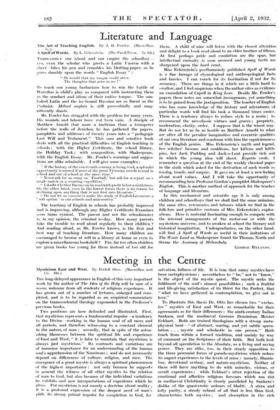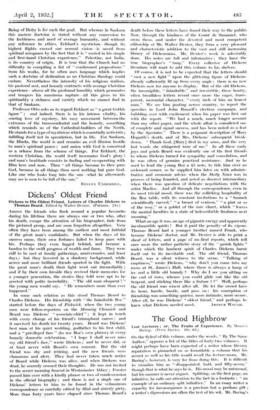Meeting in the Centre
Tin,: long-delayed appearance in English of this very important work by the author of The Idea of the Holy will be sure of a warm welcome from all students of religious experience. It .,has grown out of a number of lectures, enlarged and com- pleted, and is to be regarded as an empirical connnentary on the transcendental theology expounded in the Professor's previous books.
Two positions are here defended and illustrated. First, that mysticism represents a fundamental impulse—a tendency to the Divine—working in the human soul of all races and all periods, and therefore witnessing to a constant element in the nature, of man ; secondly, that in spite of the aston- ishing likenesses between the spiritual life and experience of East and West, " it is false to maintain that mysticism is always just mysticism." Its contrasts and variations are of immense importance for an understanding of the human soul's apprehension of the Numinous ; and do not necessarily depend on differences of culture, religion, and race. The emergence of a great mystic is always a spiritual phenomenon . of the highest importance : not only because he supports in general the witness of all other mystics to the relation of man to God, but also because of the individual variations he exhibits and new interpretations of experience which he gives. For mysticism is not merely a doctrine about reality ; it is a profound expression of the deepest need of man's pirit, its strong primal impulse for completion in God, for
salvation, fullness of life. It is true that many mystics have been metaphysicians ; nevertheless to " be," not to "know," is the object of the mystic quest. The mystic seeks the fulfilment of the soul's utmost possibilities ; such a fruitful and life-giving satisfaction of its thirst for the Perfect, that " what we have gathered in contemplation, we give out in love."
To illustrate this thesis Dr. Otto has chosen two " exclus- ive" mystics of East and West, as remarkable for their agreenients as for their differences : the ninth-century Indian Sankara, and the mediaeval German Dominican Meister Eckhart. Both are trained theologians with a strong meta- physical bent—"of abstract, soaring, and yet subtle specu- lation . . . mystic and scholastic in one person." Both teach from within a formed tradition, and mainly by way of comment on the Scriptures of their faith. But both look beyond all speculation to the Absolute, as a living and saving power. They are alike, too, in their steady opposition to the three perennial forms of pseudo-mysticism which reduce its august experiences to the levels of sense : namely, illumin- fern, devotional ecstasy, and nature-mysticism. Neither of them will have anything to do with miracles, visions, or occult experiences ; while Eckhart's utter rejection of the emotional and affective religious fervour:: which ran riot in mediaeval Christianity is closely paralleled by Sankara's dislike of, the quasterotie ardours .of .bhakti. stern and lofty purity, a _steady refusal of all_ that is less than God, characterizes both mystics ; and absorption in the rich Being of Deity is for each the goal. But whereas in Sankara this austere doctrine is stated without any, concession to the feebleness and need of average humanity, and without any.. reference to ethics, }:ekhart's mysticism—though its highest flights exceed our normal vision—is saved from spiritual arrogance by the fact that it is " rooted in his simple iiod first-hand Christian experience." Palestine, not India, is its country of origin. It is true that the Church had no difficulty in compiling a list of " condemned propositions froth his worki,- for he often uses language which implies such a doctrine of deification as no Christian theology could endure. Nevertheless the intensity of his religious realism, his pastoral zest, and homely contracts with average Christian experience—above all the profound humility which permeates and tempers his numinous rapture—all this gives to his spirituality a richness and variety which we cannot find in that of Sankara.
Professor Otto asks us to regard Eckhart as " a great Gothic figure " ; and indeed, there is in his intense vitality, his soaring love of mystery, his easy movement between the extremes of the transcendental and the homely, something which reminds us of the Cathedral-builders of the North. He stands for a type of mysticism which is essentially activistic; Mlfilling itself not in speculation, but in lik. For Sankara, the Hindu, the world is and remains an evil illusion hostile to man's spiritual peace ; and union with God is conceived as a release from the scheme of things. For Eckhart, the western Christian, the world itself incarnates God's glory ; and man's beatitude consists in finding and co-operating with Him here and now. Then " all things become to thee pure God, because in all things thim seest nothing but pure God. Like one who looks long into the sun—what he afterwards may see is seen to be full of the sun."
EVELYN UNDERHILL.

































 Previous page
Previous page